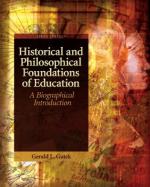|
This section contains 448 words (approx. 2 pages at 400 words per page) |

|
Historical and Philosophical Foundations of Education: A Biographical Introduction Summary & Study Guide Description
Historical and Philosophical Foundations of Education: A Biographical Introduction Summary & Study Guide includes comprehensive information and analysis to help you understand the book. This study guide contains the following sections:
This detailed literature summary also contains Topics for Discussion and a Free Quiz on Historical and Philosophical Foundations of Education: A Biographical Introduction by Gerald L. Gutek.
Gerald L Gutek wrote this updated Fourth Edition of Historical and Philosophical Foundations of Education: A Biographical Introduction in 2005, from thirty years of teaching history and philosophy of education at major universities. This work effectively presents his idea "educational biography is a valuable, powerful, but too-often neglected" learning tool about how education and transforming events and trends are interconnected through history and the world. This highly informative and effective historical narrative tells a story of education from ancient Confucius to the moderns Montessori and Dewey.
Gutek's biographical introduction clearly presents many facts of history as the backdrop against which he describes individual educators and brings them to life. His writing is so well done and enjoyable that a reader is hardly aware this is a college text. This book is such a pleasure to read that its 400 pages make a real "page-turner." Gutek begins with the ancient Confucius and Greco-Romans Plato, Aristotle and Quintilian. The author transitions to the Medieval Era with Aquinas and Erasmus and introduces the Protestant Reformation with Calvin and Comenius who claims "all knowledge" supersedes religious and nationalist conflicts. Rousseau and Pestalozzi initiate educational reform and The Enlightenment is Americanized through Thomas Jefferson, Wollstonecraft and Horace Mann who initiated the modern public school system. Education for social change and reconstruction was introduced by Owen's New Lanark. Froebel used "gifts" to promote kindergarten teaching through the world. Mill and Spencer reformulated liberalism and Addams advocated socialized education. Dewey's pragmatism tested Darwinism and Montessori internationalized childhood education. Gandhi, Du Bois and Freire conclude the author's presentation with Indian, African American and Brazilian influences.
Gerald Gutek's Historical and Philosophical Foundations of Education: A Biographical Introduction is organized in 4 parts that conclude with a 10-page index by educator and related subject. Each chapter is titled by name of the educator and provides a parallel presentation of the educators' life and times followed by study sections with questions, projects, endnotes and further reading suggestions. Information in the work is readily accessible by part, chapter title, endnotes, references and index. For example, the index entry "Education, theory of:" is followed by 23 educator names and the page numbers on which that educator's theory is referenced. Gutek's work follows an orderly progression from an overview of each educator to the historical context of their lives and educational history. Gutek provides a fully comprehensive view of the educator within context of his times, trends and challenges. His extensive presentation offers casual readers substantial well-organized information to select from and absorb. The serious researcher is provided documented guidelines and suggested paths to in-depth research. Gutek's work is suited to readers with varying interests to satisfy their own level of curiosity.
Read more from the Study Guide
|
This section contains 448 words (approx. 2 pages at 400 words per page) |

|



